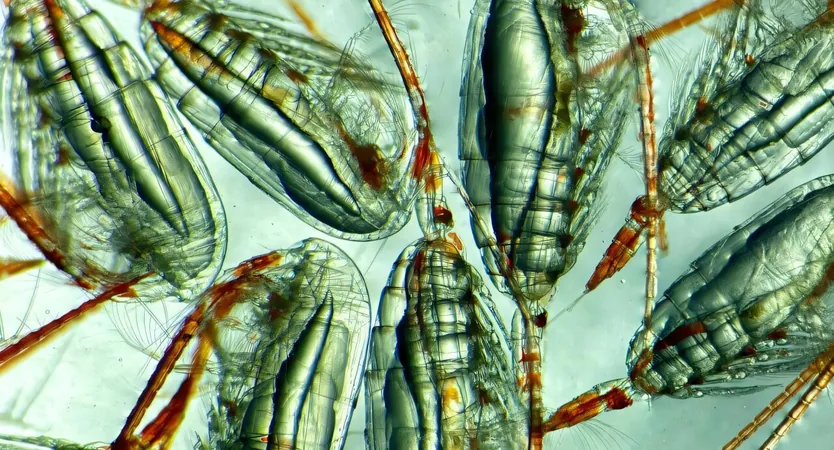
Groundbreaking Genetic Discovery Opens Door to RNA Therapies for Mental Health Issues!
2025-01-09
Author: Rajesh
Introduction
In a major breakthrough, researchers at the Medical University of South Carolina (MUSC) have unveiled a pivotal genetic mechanism that could revolutionize RNA-based therapies for treating psychiatric disorders influenced by emotional experiences. The findings, published in the esteemed journal *Science*, provide new insights into the genetic processes that can lead to enduring behavioral changes often tied to conditions like depression and substance abuse.
Research Team and Methodology
The research team, led by Dr. Makoto Taniguchi, Dr. Christopher Cowan, and Rose-Marie Akiki, delved into how emotional events—such as chronic stress and substance use—can shape behavior over time. Their investigation revealed a specific genetic structure known as an RNA:DNA ‘sandwich,’ which appears to play a crucial role in how the brain adjusts to such experiences.
Key Findings
Dr. Cowan expressed hope that this discovery will enhance our understanding of maladaptive behaviors resulting from brain changes: “We aspire to gain deeper insights into how emotional experiences shape brain circuits and lead to problematic behavior,” he stated.
Central to their discovery is a type of long non-coding RNA (lncRNA), specifically the long non-coding enhancer RNA (Inc-eRNA). This lncRNA interacts with gene regulatory regions to form structures called R-loops, which are essential for managing gene activation in response to emotional stimuli.
Focus on NPAS4 Gene
The researchers honed in on the NPAS4 gene, which is associated with stress-induced anhedonia (a lack of pleasure) and drug relapse. Their study offers the first evidence that R-loops play a vital role in regulating the NPAS4 gene in reaction to emotional experiences, consequently uncovering significant implications for understanding behavior.
Mechanism of Action
Cowan remarked on the mechanism: “By spatially and temporally connecting enhancers and promoters, R-loops appear to facilitate their interaction, thereby activating genes.”
Preclinical Findings
Utilizing preclinical mouse models, the team discovered that inhibiting R-loop formation at the NPAS4 gene markedly decreased cocaine-seeking behaviors in the brain’s nucleus accumbens. Furthermore, manipulating R-loops within the prefrontal cortex prevented stress-induced anhedonia. This underscores the crucial role R-loops play in the brain's adaptations to emotional stimuli, impacting behaviors related to substance use and mood disorders. “Changes at the genetic level influence transcription and the development of neural circuits that dictate behavior,” added Akiki.
Conservation and Broader Implications
The researchers noted that these R-loops are evolutionarily conserved across various species, suggesting their fundamental importance in neuroscience. This mechanism appears to reflect a broader function in how neural circuits adapt much like their role in the immune system, where R-loops help develop immunity. “We discovered that neurons, akin to immune cells, respond to stimuli through R-loop formation,” explained Akiki.
Future Directions
Looking forward, the research team aims to broaden their exploration of this genetic mechanism throughout different brain regions to determine if disruptions could lead to psychiatric disorders. Cowan emphasized, “This represents a novel perspective on gene activation mechanisms.”
Conclusion
This groundbreaking research not only enhances our understanding of the brain’s adaptability to emotional experiences but also paves the way for the potential development of RNA-based therapies tailored for psychiatric disorders. As we venture into the future of mental health treatments, these insights could bring new hope for patients seeking targeted and effective interventions.


 Brasil (PT)
Brasil (PT)
 Canada (EN)
Canada (EN)
 Chile (ES)
Chile (ES)
 Česko (CS)
Česko (CS)
 대한민국 (KO)
대한민국 (KO)
 España (ES)
España (ES)
 France (FR)
France (FR)
 Hong Kong (EN)
Hong Kong (EN)
 Italia (IT)
Italia (IT)
 日本 (JA)
日本 (JA)
 Magyarország (HU)
Magyarország (HU)
 Norge (NO)
Norge (NO)
 Polska (PL)
Polska (PL)
 Schweiz (DE)
Schweiz (DE)
 Singapore (EN)
Singapore (EN)
 Sverige (SV)
Sverige (SV)
 Suomi (FI)
Suomi (FI)
 Türkiye (TR)
Türkiye (TR)
 الإمارات العربية المتحدة (AR)
الإمارات العربية المتحدة (AR)